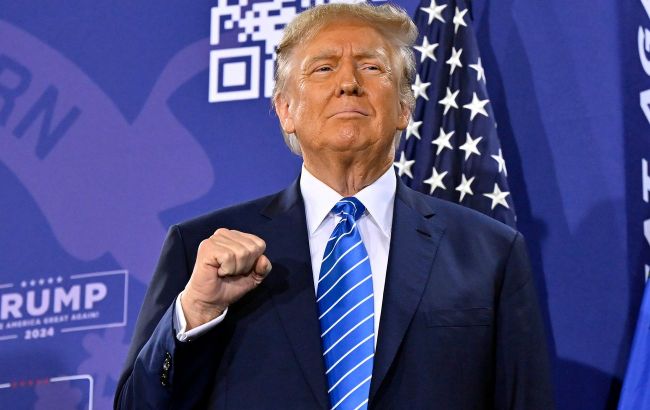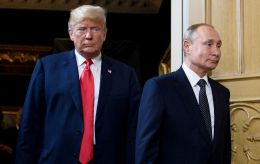'Wizard' Trump vs. 'Hero' Harris: Personas candidates using in US presidential race
 Donald Trump (photo: Getty Images)
Donald Trump (photo: Getty Images)
In the US presidential race, candidates use not only rational arguments against each other but also positive and negative emotions of the electorate.
RBC-Ukraine explains what techniques Kamala Harris and Donald Trump have in their arsenal and how they work.
Contents
- Trump and Harris are two opposites
- Discrediting and criticizing each other
- Archetypes used by Trump and Harris
Trump and Harris are two opposites
In the US election, Donald Trump and Kamala Harris are not only opposing the programs of candidates with different visions of the future of the United States. These two candidates also represent two opposites in terms of the emotions they evoke in American voters.
"American society is approaching the 2024 presidential election in an extremely polarized state. In the confrontation between Donald Trump and Kamala Harris, in addition to the traditional contradictions between Republicans and Democrats, additional conflicts have been actualized - between representatives of white and non-white races, between men and women," Svitlana Chunikhina, a political psychologist, vice president of the Association of Political Psychologists of Ukraine, says in a commentary to RBC-Ukraine.
According to her, the differences between the opponents in the struggle for the presidency are now as clear as possible.
"They are different in terms of party affiliation, age, gender, race, and attitude to the law (Harris is a former prosecutor, Trump is facing criminal charges). This will further polarize the supporters of both candidates and increase the degree of political confrontation in society to dangerous levels," Chunikhina says.
One of the manifestations of this heating up has already been the attempted assassination of Trump on July 13 this year. Trump was shot at during a rally in Pennsylvania.
According to polls conducted by the University of Virginia's Center for Politics in October 2023, 52% of Biden's supporters said that Republicans pose a threat to American life, while 47% of Trump's supporters said the same about Democrats.
Among Biden's supporters, 41% believed that violence was justified to prevent Republicans from achieving their goals. Almost as many, 38% of Trump supporters, are ready to resort to violence to stop the Democrats.
After the assassination attempt on Trump, 84% of Americans were concerned about the intensification of political violence in the United States. And two-thirds of Americans believe that the current political climate in the country is exacerbating the crisis with violence.
Discrediting and criticizing each other
According to Svitlana Chunikhina, residents of the swing states, which usually decide the fate of US elections, will experience excessive pressure from the headquarters of both candidates. Both Trump and Harris are placing a strong emphasis on discrediting their opponents in their campaigns.
"So far, we see that both candidates are exploiting the fears of their voters. Trump is constructing for his rival the image of a weak loser who indulges in any social vices, which puts voters in danger," the psychologist says.
For example, on July 31, in an interview with Fox News, Trump said that his rival would be a toy in the hands of world leaders if she won, hinting at Harris's lack of experience in foreign policy.
In another comment, Trump said that Harris had only recently started pretending to be black to win over African Americans, although she had previously identified herself as Indian.
Harris, in turn, emphasizes the dangerous unpredictability and unreliability of Trump, who despises morality and the law, says Svitlana Chunikhina.
At a rally on July 25, the Democratic candidate said that Donald Trump wants to turn the country back and hinted at what the United States could expect if the Republican wins.
"Do we want to live in a country of freedom, compassion, and the rule of law or a country of chaos, fear, and hatred?" Harris asked a rhetorical question.
"In an atmosphere of pre-election hysteria and a divided society, this can be a great challenge for all voters. In such a situation, it is very difficult to maintain common sense and stick to rational arguments when deciding who to vote for," emphasizes Chunikhina.
Archetypes used by Trump and Harris
During the election campaign, both candidates use several archetypes - universal images that are found in all cultures of the world and subconsciously evoke one or another emotional reaction.
According to Svetlana Chunikhina, Donald Trump promises voters to fix America, to fix everything that his predecessors broke. And he plans to do this with one wave of his hand, one phone call - to end the war in Europe, solve the problem of migration, etc. And in this sense, he connects to the 'Wizard' archetype. However, for voters from both political camps, he looks more like a 'Rebel' or 'Insurgent' with the difference that some look at this political rebellion with hope, while others look at it with outright horror.
"Kamala Harris has launched an advertising campaign called 'Fearless'. This decision is justified, as American society has so far shown little willingness to elect a woman president. That is why femininity should be minimally represented in Harris' campaign. In this sense, the archetype of the 'Hero' or 'Warrior' is a win-win and almost unalterable for her. An important disadvantage of this decision is the need to use the prefix 'without,' the psychologist emphasizes.
According to Chunikhina, the Republicans have a long list of things that Harris lacks as a woman and as a politician, and they will use this list. In particular, Harris, who is childless, can be an easy target for criticism from, among others, J.D. Vance, the Republican vice presidential candidate, who is the father of three and speaks about it at every opportunity.
According to the latest polls, Kamala Harris and Donald Trump's chances of winning the swing states are equal.
Sources: American politicians, opinion polls, and Svitlana Chunikhina, Vice President of the Association of Political Psychologists of Ukraine.

